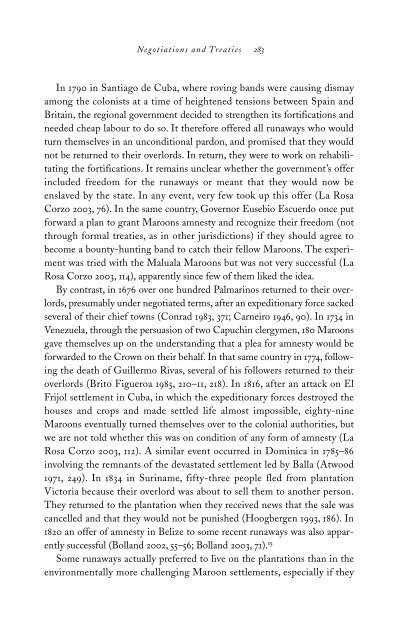60199616-flight-to-freedom-african-runaways-and-maroons-in-the-americas
60199616-flight-to-freedom-african-runaways-and-maroons-in-the-americas
60199616-flight-to-freedom-african-runaways-and-maroons-in-the-americas
Create successful ePaper yourself
Turn your PDF publications into a flip-book with our unique Google optimized e-Paper software.
Negotiations <strong>and</strong> Treaties<br />
283<br />
In 1790 <strong>in</strong> Santiago de Cuba, where rov<strong>in</strong>g b<strong>and</strong>s were caus<strong>in</strong>g dismay<br />
among <strong>the</strong> colonists at a time of heightened tensions between Spa<strong>in</strong> <strong>and</strong><br />
Brita<strong>in</strong>, <strong>the</strong> regional government decided <strong>to</strong> streng<strong>the</strong>n its fortifications <strong>and</strong><br />
needed cheap labour <strong>to</strong> do so. It <strong>the</strong>refore offered all <strong>runaways</strong> who would<br />
turn <strong>the</strong>mselves <strong>in</strong> an unconditional pardon, <strong>and</strong> promised that <strong>the</strong>y would<br />
not be returned <strong>to</strong> <strong>the</strong>ir overlords. In return, <strong>the</strong>y were <strong>to</strong> work on rehabilitat<strong>in</strong>g<br />
<strong>the</strong> fortifications. It rema<strong>in</strong>s unclear whe<strong>the</strong>r <strong>the</strong> government’s offer<br />
<strong>in</strong>cluded <strong>freedom</strong> for <strong>the</strong> <strong>runaways</strong> or meant that <strong>the</strong>y would now be<br />
enslaved by <strong>the</strong> state. In any event, very few <strong>to</strong>ok up this offer (La Rosa<br />
Corzo 2003, 76). In <strong>the</strong> same country, Governor Eusebio Escuerdo once put<br />
forward a plan <strong>to</strong> grant Maroons amnesty <strong>and</strong> recognize <strong>the</strong>ir <strong>freedom</strong> (not<br />
through formal treaties, as <strong>in</strong> o<strong>the</strong>r jurisdictions) if <strong>the</strong>y should agree <strong>to</strong><br />
become a bounty-hunt<strong>in</strong>g b<strong>and</strong> <strong>to</strong> catch <strong>the</strong>ir fellow Maroons. The experiment<br />
was tried with <strong>the</strong> Maluala Maroons but was not very successful (La<br />
Rosa Corzo 2003, 114), apparently s<strong>in</strong>ce few of <strong>the</strong>m liked <strong>the</strong> idea.<br />
By contrast, <strong>in</strong> 1676 over one hundred Palmar<strong>in</strong>os returned <strong>to</strong> <strong>the</strong>ir overlords,<br />
presumably under negotiated terms, after an expeditionary force sacked<br />
several of <strong>the</strong>ir chief <strong>to</strong>wns (Conrad 1983, 371; Carneiro 1946, 90). In 1734 <strong>in</strong><br />
Venezuela, through <strong>the</strong> persuasion of two Capuch<strong>in</strong> clergymen, 180 Maroons<br />
gave <strong>the</strong>mselves up on <strong>the</strong> underst<strong>and</strong><strong>in</strong>g that a plea for amnesty would be<br />
forwarded <strong>to</strong> <strong>the</strong> Crown on <strong>the</strong>ir behalf. In that same country <strong>in</strong> 1774, follow<strong>in</strong>g<br />
<strong>the</strong> death of Guillermo Rivas, several of his followers returned <strong>to</strong> <strong>the</strong>ir<br />
overlords (Bri<strong>to</strong> Figueroa 1985, 210–11, 218). In 1816, after an attack on El<br />
Frijol settlement <strong>in</strong> Cuba, <strong>in</strong> which <strong>the</strong> expeditionary forces destroyed <strong>the</strong><br />
houses <strong>and</strong> crops <strong>and</strong> made settled life almost impossible, eighty-n<strong>in</strong>e<br />
Maroons eventually turned <strong>the</strong>mselves over <strong>to</strong> <strong>the</strong> colonial authorities, but<br />
we are not <strong>to</strong>ld whe<strong>the</strong>r this was on condition of any form of amnesty (La<br />
Rosa Corzo 2003, 112). A similar event occurred <strong>in</strong> Dom<strong>in</strong>ica <strong>in</strong> 1785–86<br />
<strong>in</strong>volv<strong>in</strong>g <strong>the</strong> remnants of <strong>the</strong> devastated settlement led by Balla (Atwood<br />
1971, 249). In 1834 <strong>in</strong> Sur<strong>in</strong>ame, fifty-three people fled from plantation<br />
Vic<strong>to</strong>ria because <strong>the</strong>ir overlord was about <strong>to</strong> sell <strong>the</strong>m <strong>to</strong> ano<strong>the</strong>r person.<br />
They returned <strong>to</strong> <strong>the</strong> plantation when <strong>the</strong>y received news that <strong>the</strong> sale was<br />
cancelled <strong>and</strong> that <strong>the</strong>y would not be punished (Hoogbergen 1993, 186). In<br />
1820 an offer of amnesty <strong>in</strong> Belize <strong>to</strong> some recent <strong>runaways</strong> was also apparently<br />
successful (Boll<strong>and</strong> 2002, 55–56; Boll<strong>and</strong> 2003, 71). 15<br />
Some <strong>runaways</strong> actually preferred <strong>to</strong> live on <strong>the</strong> plantations than <strong>in</strong> <strong>the</strong><br />
environmentally more challeng<strong>in</strong>g Maroon settlements, especially if <strong>the</strong>y


